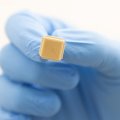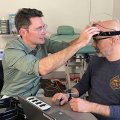UQ scientists are turning to bacteria in their fight against dengue fever.
Dr Elizabeth McGraw from UQ’s School of Biological Sciences has received almost $500,000 State Government Smart Futures Fellowship funding to investigate the possibility of infecting mosquitoes with a type of bacteria which could eventually see the complete eradication of the disease in northern Australia.
Dr McGraw’s research will focus on developing the bacteria’s ability to prevent the dengue virus from replicating inside mosquitos and reveal if infected mosquitos can be deployed to reduce transmission of dengue.
The strategy of using Wolbachia bacteria to control dengue transmission in mosquitoes has now advanced to the point of field cage testing.
This is a very cost-effective approach which will add a new tool to the existing arsenal of control measures against the dengue mosquito, with the hope of bringing about area wide elimination of disease
“What’s interesting about dengue is that only the older mosquitoes are capable of transmitting the virus," Dr McGraw said.
"The dengue virus takes time to develop inside the body of the insect and can only be transmitted in their saliva when they are older.
"By shortening the life of a mosquito using Wolbachia we could significantly decrease the ability of mosquitoes to transmit dengue virus to humans."
With no vaccine or effective treatment, direct control of the mosquito remains the best option for limiting dengue. Dr McGraw’s findings will provide vital information for an innovative biocontrol method of dengue and if successful, lead to the complete eradication of the disease in North Queensland.
“The nice thing about a Wolbachia strategy for dengue control is that it should be much more environmentally friendly than the current approach involving killing mosquitoes with insecticides. This strategy would be much less expensive for our health system as well,” she said.
The 2009 wet season in Cairns resulted in more than 900 confirmed dengue cases, with Queensland Health spending approximately $3 million on control measures.
Symptoms of dengue closely resemble the flu and can vary in severity to include a high fever of over 40°C. In some people dengue fever can lead to a life-threatening complication which might include bleeding from gums or under the skin and can result in dengue shock syndrome, haemorrhaging and hypotension.
A total of six UQ researchers last night received Fellowships, including Professor Anton Middelberg of the Australian Institute for Bioengineering and Nanotechnology, who was awarded a Smart Futures Premier's Fellowship.
UQ Smart Futures Fellows also included Dr Jana Vukovic (Queensland Brain Institute); Dr Caroline Gaus (EnTox); Dr Claudia Vickers (AIBN); and Dr Chamindie Punyadeera (AIBN).
Dr McGraw said she would use her fellowship to carry out a series of lab tests with a view to trialling the release of infected mosquitoes in to uninfected wild populations under controlled conditions.
She said all going well, field-testing of the biological control method would start during the next wet season in North Queensland, pending regulatory approval and community support.
UQ Deputy Vice-Chancellor (Research) Professor Max Lu congratulated Dr McGraw, and commended the government for supporting research with the potential to deliver solutions for international communities as well as for Queenslanders.
“Elizabeth McGraw joins an expanding club of UQ researchers who are attracting substantial Queensland Government fellowships, enabling them to advance towards outcomes with state, national and global impact,” Professor Lu said.
Dr McGraw will work closely with Professor Scott O’Neill, also from the School of Biological Sciences, who was pioneering the use of Wolbachia to fight dengue.
“Professor O’Neill, together with a team of Australian and International collaborators, is developing Wolbachia to be used in two ways against mosquitoes. Firstly, the team plans to use the bacterium to limit the replication of the virus inside mosquitoes and second, use the bacterium to shorten the lives of mosquitoes,” Dr McGraw said.
The Queensland State Government will provide $300,000 funding toward the project, The University of Queensland is contributing $142,479 and the Foundation for the National Institutes of Health, as part of the Grand Challenges in Global Health initiative of the Bill and Melinda Gates Foundation, is providing an additional $180,000.
For more information, please visit: www.eliminatedengue.com
BIO: Elizabeth McGraw is a senior lecturer in genetics in the School of Biological Sciences at the University of Queensland. Dr McGraw’s laboratory seeks to understand how insects respond to bacterial infections. Dr McGraw’s group research is helping to develop a bacterial infection in mosquitoes that can prevent them transmitting dengue virus to humans.
Media: Dr Elizabeth McGraw (3365 7404, e.mcgraw@uq.edu.au) or Tracey Franchi, Manager – Communications, Outreach and Performance Data in the School of Biological Sciences (3365 4831, t.franchi@uq.edu.au).
.jpg)











